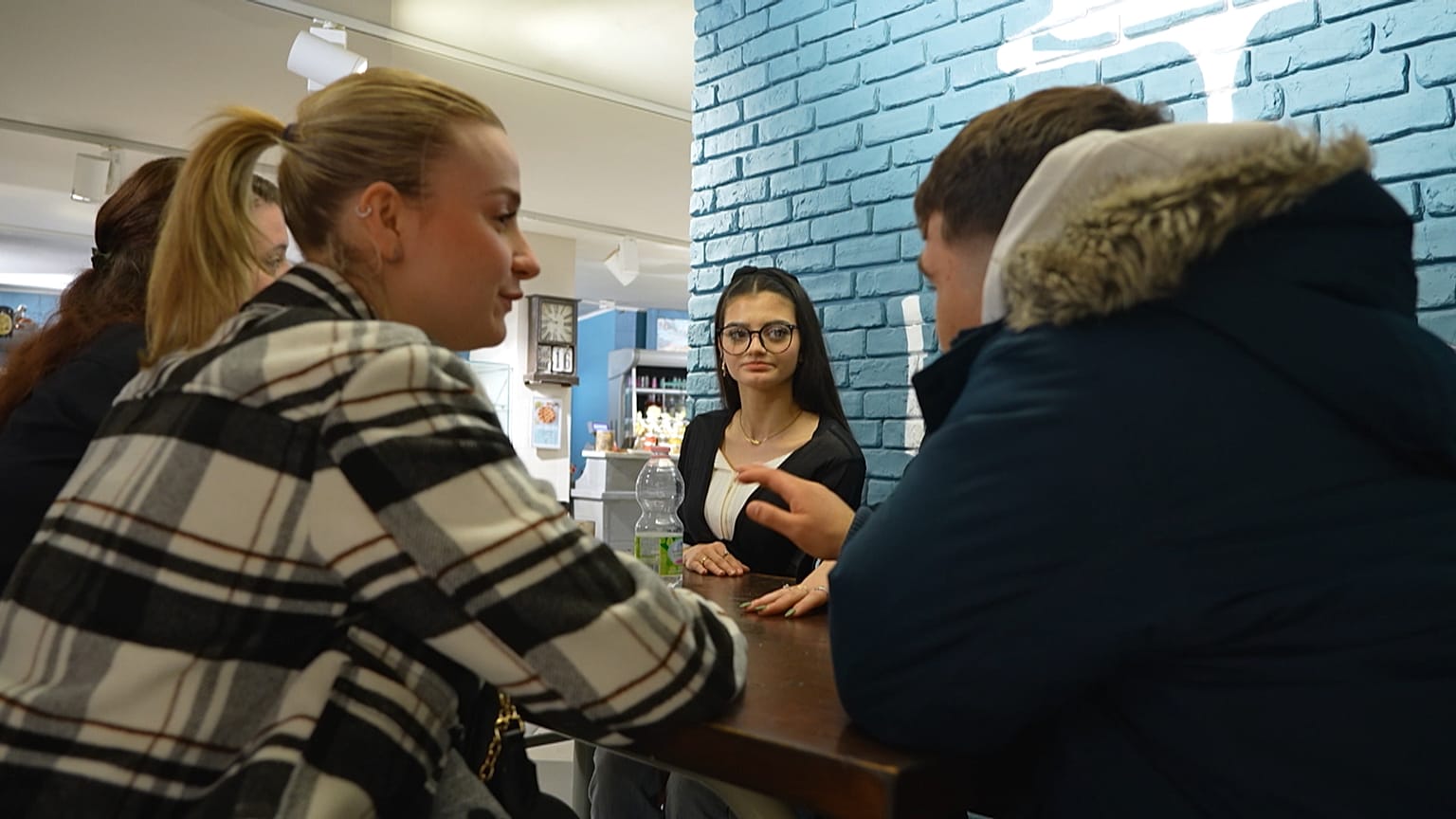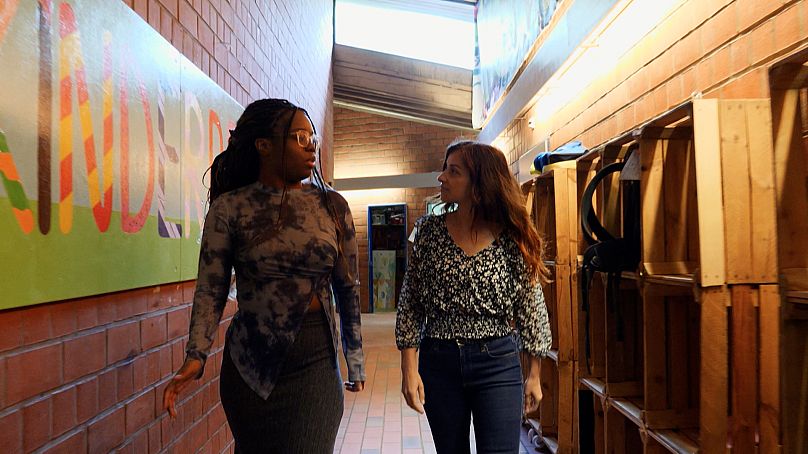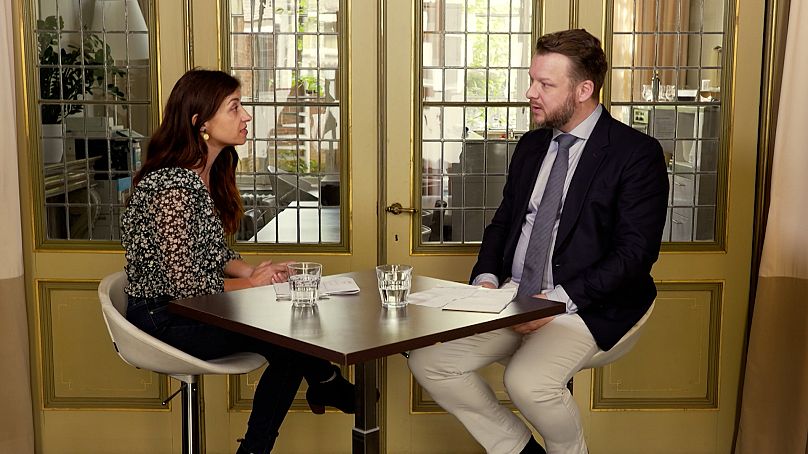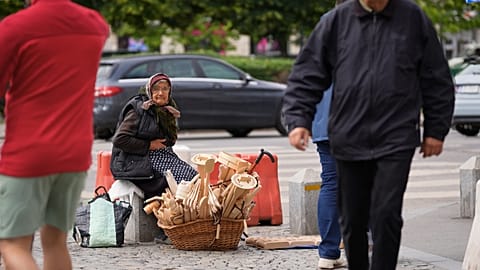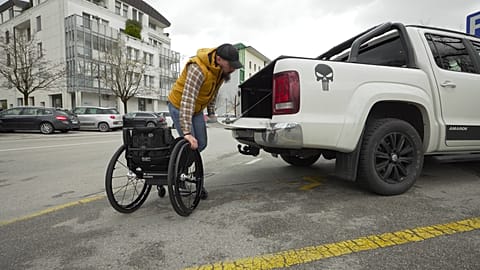In this episode of Real Economy, Euronews reporter, Fanny Gauret, travels to Recklinghausen, Germany, to meet two young women who completed the EU's ALMA programme and, as a consequence, are optimistic for the future.
Furthering one's education and navigating the job market can be a daunting task...
Especially if you are a young person in Europe already struggling to find a job, have poor access to training schemes or have left school without any qualifications.
If you find yourself ticking off those boxes and are between the ages of 16 and 29 then you might have fallen into a category of unemployed youths formally known as NEETs in Europe - a young person who is not in employment, education or training.
This phenomenon isn't restricted to Europe, it's a global one, the International Labour Organisation reported that a fifth of people worldwide between the ages of 15 and 24 were classed as NEETs in 2023.
According to EU data, factors such as having a low family income, a disadvantaged family background or a disability can increase one's risk of becoming a NEET.
But could a work experience abroad help people out of this precarious situation?
Both Hatice Fahel and Jasmin Nsimba Kanza seem to think so; they both joined the EU's ALMA initiative which offers disadvantaged NEETs under 30 years of age professional and personal experience abroad.
An opportunity in Bel Paese
After high school, Hatice, a 20-year-old German girl, spent two months in Vercelli, Italy, focusing on her future prospects.
"I made many new Italian friends and got to know a new language. I liked working there in a hotel and learned many things at my work. Now I feel more free, more confident. So it's opened my eyes and my perspectives about other things," she told Euronews.
Thanks to this professionally and culturally immersive experience, Hatice has now drawn up a career plan with the support of her mentors.
"My dream career is to become a doctor someday. To go and study medicine. Everywhere you need, like, exams so, yeah, I still have to clear that out. And to start my career," she said.
A total of almost €11 billion has been invested in this EU scheme and Germany is one of 15 countries taking part.
Andrea Moraru is a project Manager for RE-INIT, the NGO coordinating the programme in Recklinghausen, Germany, outlined how participants in the programme learn how to manage their own money and become more independent.
"We are trying to empower them to motivate them into achieving what they don't even know they can achieve. They get to be on their own feet for the first time," Moraru told Euronews.
ALMA participants receive mentoring for four months when they return and according to Moraru, the results speak for themselves: "In the last group more than 50 per cent found work, or were accepted into an educational or training programme," explained Moraru.
Furthering one's education can reduce the likelihood of a young person falling into the NEET category. For example, in 2022 only eight per cent of young people with a high level of education in Europe fell into this category compared to 13.6 per cent with a low level.
First experiences in the Land of the Gods
Jasmin, who went to Greece two years ago, explained that she had thought about going abroad on a programme like this for a long time as family circumstances had prevented her from pursuing higher education.
"I learned so much and there were a lot of first times for me. For example, I went to the beach and the sea, met new people and experienced a completely new culture," she explained.
Jasmin found a job at a hotel restaurant in Greece and concluded that she felt very supported throughout the initiative.
"I have become more open and have more courage now to change, I am ready for change. After this experience, I applied for a design course at a vocational college with a focus on media and communication and was accepted. I start in the autumn."
Germany has one of the lowest levels of NEETs in the European Union and it’s evident that both Jasmin and Hatice have benefited from the ALMA project, however, they wouldn’t be where they are today if it were not for their proactive and positive mindsets.
Due to the varying social and economic challenges that exist across the EU, it can be easier for some to find the motivation and opportunities necessary to advance their careers than others.
NEETS: 'More likely to live a life of social exclusion'
In an interview with Real Economy, Mark Levels, a quantitative sociologist and professor at Maastricht University, broke down why it is much easier for some NEETS to find a way out of this apparent rut than others and why social integration remains a major challenge.
Fanny Gauret, Euronews: What are the consequences of being classed as NEET for an individual and society?
Professor Mark Levels, Maastricht University: The status of NEET is related to a whole range of social problems. So NEETs are much more likely to be poor, much more likely to live a life of social exclusion, and much less likely to transition to the labour market later on. For society, the total cost in terms of missed labour productivity, the cost of social programs, and also the cost of trying to regulate crime and so forth, are huge. So they amount to about €142 billion a year.
Fanny Gauret, Euronews: Can having an experience living and working abroad lead to a lasting change?
Professor Mark Levels, Maastricht University: These types of experiences can signal that you can perform several things that might be very much in demand. So, they can work, but for the most vulnerable ones, the low-skilled ones here, they do not work. And that requires a completely different approach.
Fanny Gauret, Euronews: Are there any countries or policies that can serve as a model in your research?
Professor Mark Levels, Maastricht University: Germany has a very well-functioning vocational education system. We see here that the school-to-work transition actually works and works very well. The issue is that you cannot just take an education system from one country and implement it in another country. You have completely different cultural settings, that makes it kind of difficult to export.
Fanny Gauret, Euronews: What steps should governments and educational institutions take to help young people and NEETs transition from education to work?
Professor Mark Levels, Maastricht University: If there's one thing that we know can predict a status as vulnerable as NEET, it's early school leaving. So invest in your education system. Invest in keeping people on board. Invest in programs that teach children skills that are in demand in the labour market. And then, you reduce the chance that they become NEET, and then secondly, focus on the most vulnerable children, put them front and centre.
To watch Fanny Gauret's full report, click on the video in the media player above.














